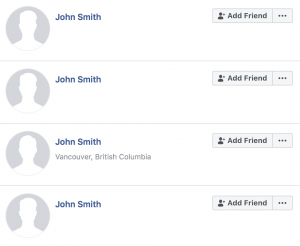Have you ever typed a candidate’s name into Facebook, LinkedIn or another social media platform to learn who they are behind the resume?
We’ve all been there. While our intention is innocent enough, there are risks associated with using information from social media in your hiring decision making process. As an employer, it is important to be aware of them.
Just Because You See It, Doesn’t Make It Public
 According to PIPA, information in the form of an electronic publication or that is available in a publicly accessible registry is fair game for social media checks. Public information like social media profiles, stories, and videos are likely considered electronic publications.
According to PIPA, information in the form of an electronic publication or that is available in a publicly accessible registry is fair game for social media checks. Public information like social media profiles, stories, and videos are likely considered electronic publications.
However, this information can not be collected, used, or disclosed IF there has been a court order to stop the continued publication of it or if the publishing of information has been deemed contrary to the Act.
What the heck does that mean? If there is unknowingly a publication ban in effect on any information used in your decision making, you could get into trouble. It can be difficult to know what information is actually public. To avoid this risk, stick to using mainstream social media sites and official sources.
Protected Rights Could Lead to Fights
Another area where employers can get into trouble, is if the social media search results in findings related to a protected ground and the candidate does not get a job offer. The decision will stand in court provided that the employer has other valid documented reasons for not hiring.
However there have been cases where unsuccessful candidates challenge the employer in the Human Rights Tribunal. Take for example, a candidate who makes political statements on Facebook. If this candidate alleges that this protected right was grounds for the decision and you have no documentation to prove otherwise, things could get messy.
Accuracy Is King
 Keep in mind, things that employers find in a search may be old, misleading, or inaccurate all together. Facebook has about a thousand John Smiths, so you can imagine it’s not hard to mistake the wrong profile for the person you are looking into.
Keep in mind, things that employers find in a search may be old, misleading, or inaccurate all together. Facebook has about a thousand John Smiths, so you can imagine it’s not hard to mistake the wrong profile for the person you are looking into.
The onus is completely on the employer to ensure applicant information collected is accurate if it used for any decision making. This includes falsified information or incorrectly labeled photographs. Make sure to take the steps to ensure all information is accurate.
Best Practices to Avoid Issues and Risks
So now that you’re probably freaking out that every Instagram or Facebook search you’ve ever done could end in a lawsuit, remember that these are extreme cases. You are part of a big pool of employers who choose to investigate in this way. So, instead of worrying, follow these simple steps to get a big due diligence thumbs up from Caitlin!
- Stick to accurate sources and avoid gossip websites
- Use caution when the candidate information is posted by someone else

- Limit social media searches to top candidates only, not every applicant
- Be consistent when looking up top candidates (don’t select just 1 or 2)
- Do not obtain information under the false pretext of a social relationship (i.e. falsely “friending” the applicant)
- Consider only doing social media checks for certain positions
- Consider context, how old the information is, and if it is a pattern or a one time thing
- If information is relevant to decision, give applicants the chance to explain
- Hold onto information used in hiring decisions for at least one year so the individual can have access to it if required (Candidates have the right to any personal information used in decision-making according to PIPA and PIPEDA)
Some Serious Red Flags
Some examples of potentially relevant information relating to character and professionalism would include:
- Trash talking current or former employers, clients, or coworkers
- Disclosing confidential information about employers, clients, or coworkers
- Bragging about calling in sick when not actually sick
- Vandalism or destruction of property.
To Summarize…
Candidates these days should know how to maintain clean public profiles so it doesn’t impede the ability to land their dream job. Although consent from candidates prior to investigating isn’t necessary, it is the most legally sound way to approach social media searches. Being aware of potential liabilities doesn’t mean that you need to stop searching. However, we encourage all of our partners to use these resources mindfully.
Interested in learning how we can support your team with effective and compliant hiring?
Contact us today for your free 30 minute consultation: